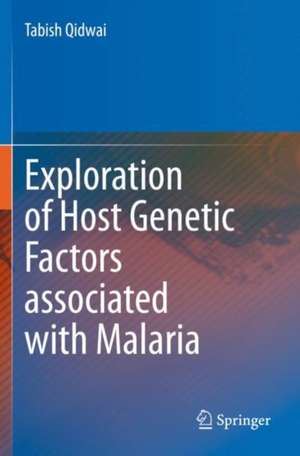Exploration of Host Genetic Factors associated with Malaria
Autor Tabish Qidwaien Limba Engleză Paperback – 9 mar 2022
| Toate formatele și edițiile | Preț | Express |
|---|---|---|
| Paperback (1) | 1038.66 lei 38-45 zile | |
| Springer Nature Singapore – 9 mar 2022 | 1038.66 lei 38-45 zile | |
| Hardback (1) | 1158.81 lei 3-5 săpt. | |
| Springer Nature Singapore – 8 mar 2021 | 1158.81 lei 3-5 săpt. |
Preț: 1038.66 lei
Preț vechi: 1093.32 lei
-5% Nou
Puncte Express: 1558
Preț estimativ în valută:
198.80€ • 206.76$ • 166.59£
198.80€ • 206.76$ • 166.59£
Carte tipărită la comandă
Livrare economică 10-17 martie
Preluare comenzi: 021 569.72.76
Specificații
ISBN-13: 9789813347632
ISBN-10: 9813347635
Pagini: 172
Ilustrații: XI, 172 p. 79 illus., 48 illus. in color.
Dimensiuni: 155 x 235 mm
Greutate: 0.35 kg
Ediția:1st ed. 2021
Editura: Springer Nature Singapore
Colecția Springer
Locul publicării:Singapore, Singapore
ISBN-10: 9813347635
Pagini: 172
Ilustrații: XI, 172 p. 79 illus., 48 illus. in color.
Dimensiuni: 155 x 235 mm
Greutate: 0.35 kg
Ediția:1st ed. 2021
Editura: Springer Nature Singapore
Colecția Springer
Locul publicării:Singapore, Singapore
Cuprins
Chapter 1. Human genetics and infectious disease.- Part 1. RBC disorders.- Chapter 2. Sickle cell gene.- Chapter 3. Alpha-Thalassemia.- Chapter 4. Beta-Thalassemia.- Chapter 5. Duffy blood group locus.- Part 2. Metabolic enzymes.- Chapter 6. Pyruvate kinase deficiency.- Chapter 7. Glucose 6-Phosphate dehydrogenase.- Part 3. Host immune response.- Chapter 8. TNF genetic polymorphisms.- Chapter 9. iNos genetic polymorphisms.- Chapter 10. Human complement receptor 1 polymorphisms.- Chapter 11. Interferonalpha receptor-1 (IFNAR1) polymorphisms.- Part 4. Cytoadherence.- Chapter 12. Intercellular adhesion molecule-1 polymorphisms.- Chapter 13. Platelet endothelial cell adhesion molecule-1 (PECAM-1) polymorphisms.- Chapter 14. Vascular cell adhesion molecule-1 (VCAM1) polymorphisms.
Notă biografică
Dr. M. Tabish Qidwai is an Assistant Professor at SRM University, Uttar Pradesh. India. He previously served as an Assistant Professor (contract) in the Department of Biotechnology at Babasaheb Bhimrao Ambedkar University, Lucknow (A Central University) from 2015-2018; Assistant Professor in the Department of Biotechnology at Raja Balwant Singh College Agra, UP. His research interests are focused on the functional genomics and immunology especially polymorphisms, immunogenetics, and computational biology. He has received with various prestigious awards including the Rashtriya Gaurav Award for remarkable contributions to Science and Technology, Chancellor Gold Medal for first rank in University. He has more than 8 years of teaching experience in genomics, immunology and computational biology. He has published more than 30 research and review articles in peer-reviewed international journals and authored numerous book chapters. He is a member of several national and international scientific societies and organizations including the Indian Science Congress Association, Indian Biophysical Society, Society of Biological Chemists India, Member of International Association of Engineers (IAENG), China, and European Federation of Biotechnology.
Textul de pe ultima copertă
This book is aimed to cover the role of genetic polymorphisms in human genes related to RBC disorders, metabolic enzymes, immune response, and cytoadherence in the susceptibility/resistance to malaria caused by Plasmodium falciparum. The chapters provide current information on the balancing trait and the significance of such traits in the malaria resistance. The book covers polymorphisms in the genes of the red blood cells-sickle cell anaemia; glucose-6-phosphate dehydrogenase deficiency and thalassemia that confer protection against malaria. In addition, the book explores selection of genetic variations in the human genome as genetic control mechanism against malaria in endemic regions. It also provides a comprehensive overview of the molecular epidemiology and natural selection of alleles in the genes which are associated with malaria, and presents description of the role of human genetic polymorphisms in malaria disease risk and disease outcome.
Caracteristici
Summarizes host genetic polymorphisms that are associated with malaria susceptibility/resistance
Reviews molecular epidemiology and natural selection of alleles in genes associated with malaria
Examines the malarial parasite-imposed selective pressure on the human genome
Covers the genetic control mechanisms in the human genome against malaria in endemic regions
Reviews molecular epidemiology and natural selection of alleles in genes associated with malaria
Examines the malarial parasite-imposed selective pressure on the human genome
Covers the genetic control mechanisms in the human genome against malaria in endemic regions
